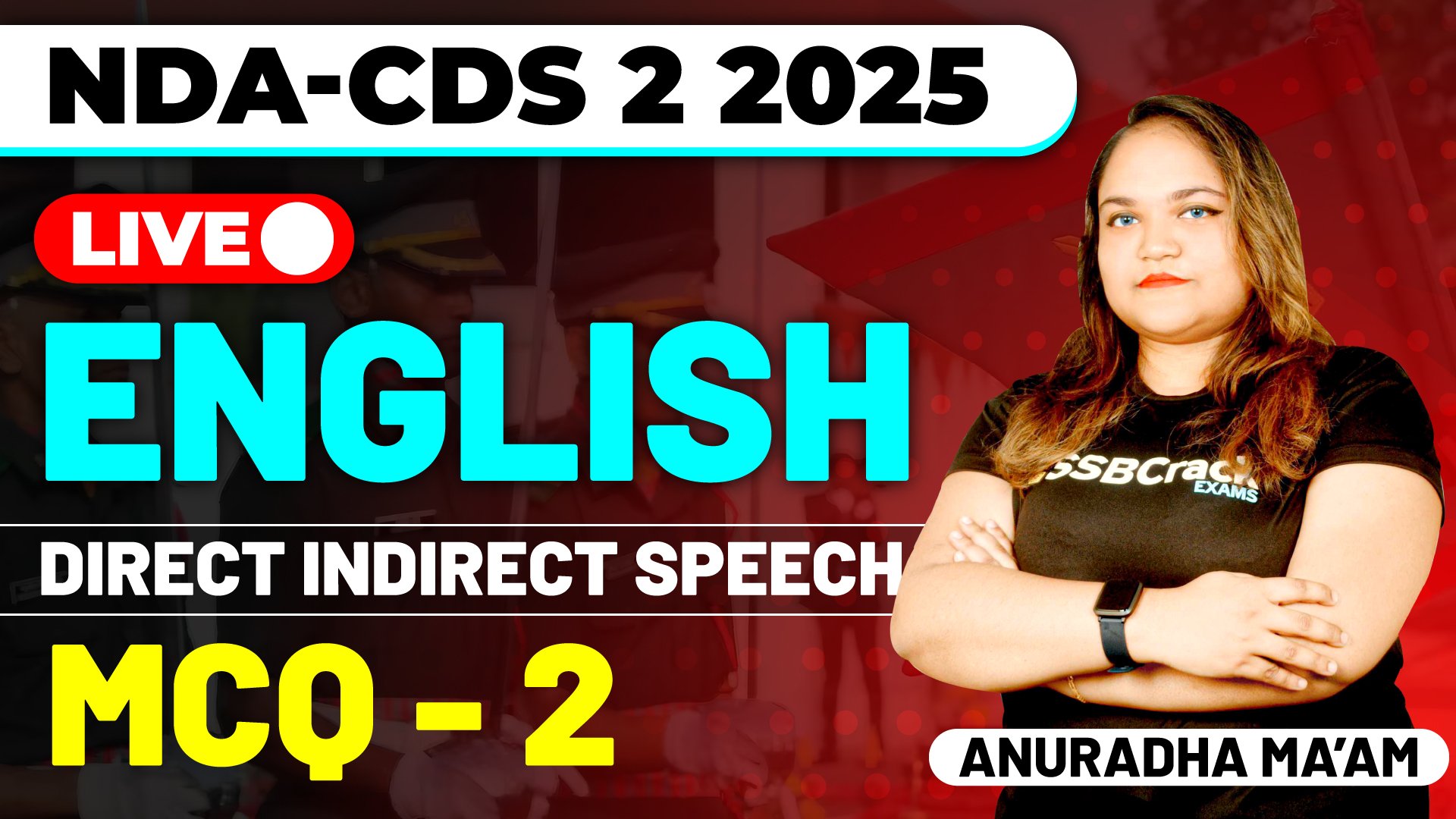The English section of the NDA & CDS 2 2025 Exams serves as a vital scoring ground for candidates aiming for a defence career. Among the high-frequency grammar topics, Direct and Indirect Speech (Reported Speech) stands out as a rule-based, logic-driven, and scoring area that tests both language understanding and application accuracy.
In the Direct-Indirect Speech MCQ Live Class 2, candidates solved exam-oriented multiple-choice questions that required them to convert direct speech into indirect speech. This session emphasized applying the correct transformation rules for different sentence types—assertive, interrogative, imperative, and exclamatory—while focusing on tense backshifting, pronoun changes, reporting verbs, and connector usage.
Directions: In the following questions, a sentence has been given in Direct/Indirect Speech. Out of the four alternatives suggested select the one which best expresses the same sentence in Indirect/Direct Speech.
Q) Sumit said, “I will be leaving for London this summer so I can meet you only when I return.”
(a)Sumit said he will be leaving for London this summer and he could meet him only when he returned.
(b)Sumit said he will go to London this summer and he would meet me only when he will be returning.
(c)Sumit said that he would be leaving for London that summer and he could meet me only when he returned.
(d)Sumit said he will have gone to London that summer and could meet me only when he returned.
Ans. (c)
Q) Mary said, “I have to be there by 10 a.m. tomorrow.”
(a) Mary says to me that she has to be there by 10 a.m.
(b) Mary tells me she has to be there by 10 a.m. tomorrow.
(c) Mary told me that she had to be there by 10 a.m. the next day.
(d) Mary is telling me that she has to be there by 10 a.m. tomorrow.
Ans. (c)
Q) My friend told me I could stay at his place in Dehradun whenever I wished.
(a)My friend said, “You will be coming to stay at my place in Dehradun whenever you wish.”
(b)My friend said, “If you are wishing to come to Dehradun come and stay in my place.”
(c)My friend said, “You can stay at my place in Dehradun whenever you wish.’’
(d)My friend said, “You will come and be staying in my place in Dehradun whenever you wish.”
Ans. (c)
Q) “Don’t overspeed at night,” I said to Irina.
(a) I warned Irina not to overspeed at night.
(b) Over speeding at night is not good, I said to Irina.
(c) I warn to Irina not to overspeed at night.
(d) I had been warning Irina not to overspeed at night.
Ans. (a)
Q) My boss said, “Do you think you can complete the report within five days?”
(a)My boss said to me do you think I can complete the report within five days?
(b)My boss asked me whether I thought I could complete the report within five days.
(c)My boss said to me if I think I can complete the report within five days.
(d)My boss says do you think you can complete the report within five days?
Ans. (b)
For more questions, check out NDA & CDS 2 2025 Exam English Live – Direct Indirect Speech – MCQ Class 2
Why Direct-Indirect Speech Deserves Focus
This topic checks a candidate’s ability to report statements correctly, which is essential not only for exams but also for effective professional communication. The transformation from direct to indirect speech demands accuracy in:
- ✅ Tense shifting based on the reporting verb
- ✅ Pronoun substitution to match the change in speaker/listener
- ✅ Use of appropriate reporting verbs like said, told, asked, ordered, exclaimed
- ✅ Proper conjunctions such as that, if, whether, or WH-words
- ✅ Adjustments in modals, adverbs of time/place, and sentence structure
Common Errors Observed and Addressed
| Error Type | Correction Strategy Taught |
|---|---|
| Failing to change modal verbs like “can”/“will” | Memorize common modal conversions |
| Ignoring demonstrative changes (“this” → “that”) | List and revise adverbial/time/place shifts |
| Using wrong reporting verbs | Use “told” only when an object is present; “said” otherwise |
| Retaining question word order in indirect speech | Reframe into a statement (no question marks!) |
| Skipping connector words | “that” is required for assertive, “if/whether” for yes/no |
Pro Tips Shared in Class
- Always identify the reporting verb first—it determines tense change
- Break the sentence down into subject, verb, object before transforming
- Underline all references (pronouns, modals, time indicators) before converting
- Practice all types: Assertive, Imperative, Interrogative, Exclamatory
- Maintain a tense backshift table and connector guide for daily revision
Final Thoughts
The Direct-Indirect Speech MCQ Live Class 2 enabled NDA & CDS 2 2025 aspirants to master the practical application of transformation rules through real exam-style questions. This topic continues to be a predictable and high-scoring segment in the English section and allows aspirants to demonstrate not only grammatical mastery but also the logical ability to process sentence structure and meaning.
With regular practice and conceptual clarity, candidates can confidently ace this topic and add crucial marks to their English score.







